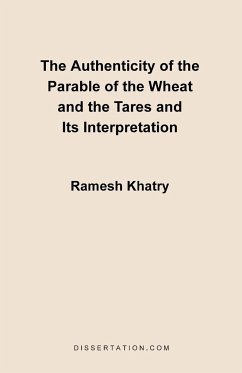This thesis seeks to demonstrate the authenticity (as dominical teaching) of the parable of the darnel (Mt 13:24-30) and its interpretation (Mt 13:36-43). The interpretation in particular is almost universally regarded as non-dominical, notably by J Jeremias and his followers. My thesis argues that the whole of Mt 13:36-43 (and Mt 13:24-30) should be seen as dominical. The 'introduction' gives a brief survey of parabolic studies, and outlines the case against the authenticity of Mt 13:24-30,36-43. Chapter AI defends the authenticity of the parable (Mt 13:24-30). The following chapters do the same for the interpretation (Mt 13:36-43), looking at the 'Son of Man' and related teaching (chapter BI), the 'kingdom of God' (BII), 'righteousness' and 'lawlessness' (BIII), and other motifs (BIV), and finally the question of the coherence of the parable and its interpretation (BV). My approach has been negatively to demonstrate the weakness of the scholarly arguments against authenticity and positively to offer a case for authenticity via (a) a study of background, including special study of the rural Palestinian practices and of relevant Jewish theological ideas, and (b) a careful use of the criterion of multiple attestation which demonstrates that our material is linguistically and theologically coherent with other well-attested Jesus tradition. The originality of the work lies apart from anything else in the fact that a full length defence of the authenticity of Mt 13:24-30,36-43 has not been attempted before. But we have also brought to bear various insights, canvassed in other contexts, but not specifically in connexion with Mt 13:24-30,36-43, e.g. suggesting a background to the Son of Man tradition in Ezekiel and the Similitudes of Enoch, making use of the Old Testament concept of God as farmer, explaining the agricultural background to the parable and interpretation.
Bitte wählen Sie Ihr Anliegen aus.
Rechnungen
Retourenschein anfordern
Bestellstatus
Storno









